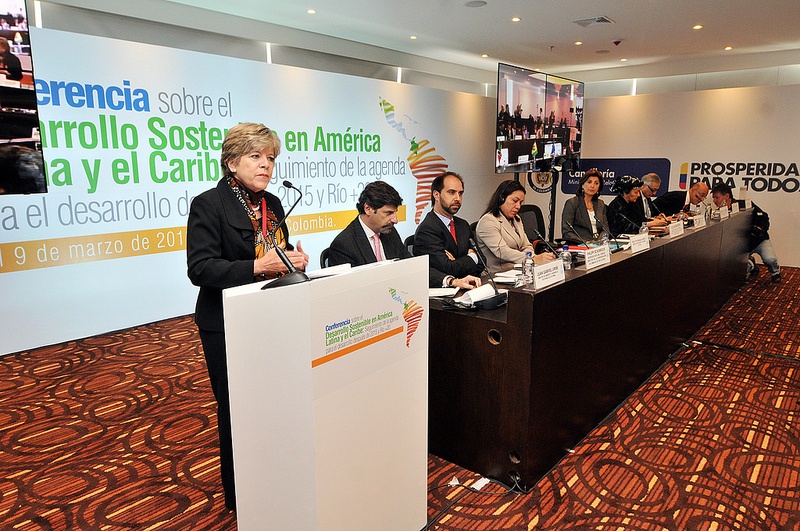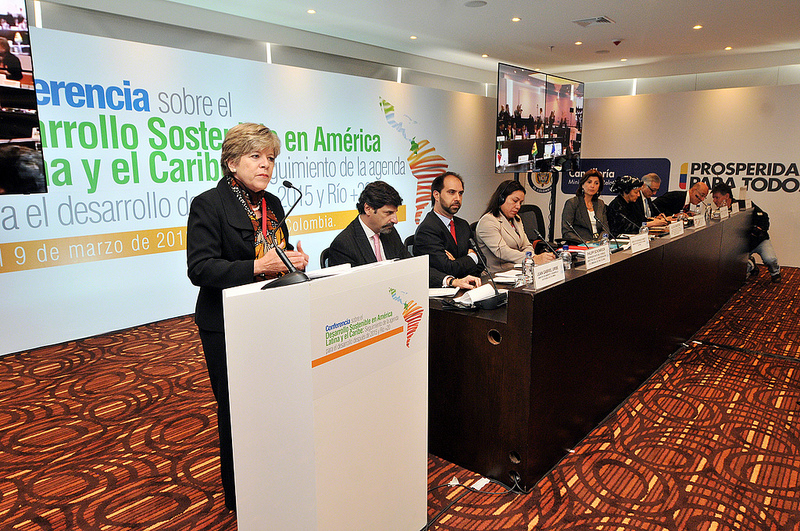Authorities and Experts Call for a Global, Unified, Comprehensive and Equitable Post-2015 Development Agenda
Work area(s)
Latin American and Caribbean countries met to assess progress in achieving the Millennium Development Goals and the Rio+20 agreements.

(9 March 2013) At the closing session of a regional conference today in Bogotá, Colombia, authorities from several Latin American and Caribbean countries and international experts agreed on the urgency of building a global, unified, comprehensive and equitable post-2015 development agenda that is relevant to everyone.
The Conference on Sustainable Development in Latin America and the Caribbean: Follow-up to the development agenda beyond 2015 and Rio+20, which began on 7 March in Bogotá, was organized by the Government of Colombia and the Economic Commission for Latin America and the Caribbean (ECLAC) and was attended by all United Nations agencies in the region, as well as intergovernmental and civil-society organizations.
The meeting was held as the region's first step towards adopting a regional perspective on examining progress towards the Millennium Development Goals (MDGs) and the post-2015 development agenda, as well as the agreements adopted at the United Nations Conference on Sustainable Development (Rio+20) held in June 2012.
The closing ceremony was attended by Alicia Bárcena, Executive Secretary of ECLAC, Alva Baptiste, Minister of Foreign Affairs, International Trade and Aviation of Saint Lucia, Antonio Patriota, Minister of Foreign Affairs of Brazil, and María Ángela Holguín, Minister of Foreign Affairs of Colombia.
Alicia Bárcena said that participants had come to the meeting "to listen to each other, to rediscover the value of being together and to enrich our own reflections with the invaluable input of others' views. We are living in a time of unprecedented regional unity, and we have a historic opportunity to jointly rethink an equality-based development paradigm".
According to Minister Alva Baptiste "Discussions have been focused and productive, and we now have much information to guide us in our ambitious post-2015 development agenda."
Minister Antonio Patriota stated that, in recent years, discussions on sustainable development had become more important and in depth, while MDGs had inspired new enthusiasm for action in the international community. The post-2015 agenda will therefore have two complementary dimensions: continued advances in MDGs and a consolidation of the results of Rio+20.
Minister María Ángela Holguín stated that "We should all consider the success of this meeting as an incentive to continue working together as a region, with the constructive attitude that has guided these discussions. [...] This Latin American and Caribbean meeting is an important guideline for the deliberations of the UN Secretary-General's High-level Panel on the Post-2015 Development Agenda".
Over three days, participants discussed the challenges facing the region in terms of building a more ambitious post-2015 development agenda that promotes growth with greater cultural awareness, solidarity with the most vulnerable societies, inclusion, protection, social equality and environmental sustainability.
The event was attended by the Ministers of Foreign Affairs of Guatemala, Fernando Carrera, and Costa Rica, Enrique Castillo, as well as Vice-Ministers from several countries. Also in attendance were Heraldo Muñoz, Chair of the United Nations Development Group - Latin America and the Caribbean (UNDG-LAC), Amina J. Mohammed, Special Advisor of the UN Secretary-General on Post-2015 Development Planning, Gisela Alonso and Patricia Espinosa, members of the High-level Panel on the Post-2015 Development Agenda set up in July 2012, and Minister María Ángela Holguín.
The inter-agency UN document Sustainable Development in Latin America and the Caribbean Follow-up to the United Nations development agenda beyond 2015 and to Rio+20 was presented during the conference, includes contributions from 17 United Nations agencies in the region, and was coordinated by ECLAC.
The report states the need for a new development model based on structural change for equality and environmental sustainability.
According to the inter-agency publication, global governance for sustainable development should be based around fair trade, technology transfer, international financial reform and new funding mechanisms, the promotion of South-South cooperation and the strengthening of social participation mechanisms.
The conference was preceded by the Caribbean Forum: Shaping a Sustainable Development Agenda to address the Caribbean Reality in the 21st Century, which was also held in Bogotá on 5 and 6 March.
This event was attended by, among others, Carolyn Rodrigues-Birkett, Minister of Foreign Affairs of Guyana and Chair of the Caribbean Development and Cooperation Committee (CDCC) - which is a subsidiary body of ECLAC -, John Maginley, Minister of Tourism, Civil Aviation and Culture of Antigua and Barbuda, Arnaldo Brown, Minister of State in the Ministry of Foreign Affairs and Foreign Trade of Jamaica, Winston Dookeran, Minister of Foreign Affairs of Trinidad and Tobago and Colin Granderson, Assistant Secretary-General of the Caribbean Community (CARICOM).
For more information, please visit the ECLAC website.
Any queries should be sent to the ECLAC Public Information and Web Services Section in Santiago, Chile.
E-mail: prensa@cepal.org; Telephone: (56 2) 2210 2040.
Follow us on: Twitter, Facebook, Flickr and YouTube.
Related content

Equality and Environmental Sustainability Are at the Heart of the Post-2015 Development Agenda
Latin American and Caribbean countries meet to assess progress towards achieving MDGs and Rio+20 agreements.
Country(ies)
- Latin America and the Caribbean
-
Colombia
Contact
Public Information Unit
- prensa@cepal.org
- (56 2) 2210 2040